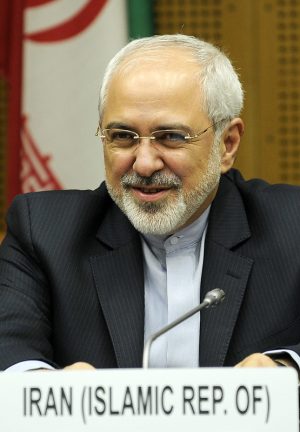Speaking on Monday, Iranian Foreign Minister Javad Zarif said that Iran would leave the Treaty on the Nonproliferation of Nuclear Weapons (NPT) if the European Union refers Iran’s nuclear activities to the United Nations Security Council.
“If the Europeans continue their improper behavior or send Iran’s file to the Security Council, we will withdraw from the NPT,” Zarif said, according to IRNA, Iran’s official news agency.
The Iranian foreign minister’s statement followed a decision by the United Kingdom, France, and Germany—the three European parties to the Joint Comprehensive Plan of Action, the 2015 agreement limiting Iran’s civil nuclear program in exchange for sanctions relief—to invoke the agreement’s dispute resolution mechanism.
The decision by the European states to refer concerns over Iran’s compliance with the 2015 agreement followed a fifth step by Tehran announced earlier this month to reduce its compliance with the agreement. Iran announced that it would cease observing limits on uranium centrifuges codified in the agreement.
Iran started reducing its compliance with the 2015 agreement in May 2019, one year after the United States announced that it would withdraw from the agreement and reimpose sanctions that had been lifted pursuant to the JCPOA.
“We do not accept the argument that Iran is entitled to reduce compliance with the JCPoA. Contrary to its statements, Iran has never triggered the JCPoA Dispute Resolution Mechanism and has no legal grounds to cease implementing the provisions of the agreement,” the three European JCPOA members said in a statement last week.
“We have therefore been left with no choice, given Iran’s actions, but to register today our concerns that Iran is not meeting its commitments under the JCPoA and to refer this matter to the Joint Commission under the Dispute Resolution Mechanism, as set out in paragraph 36 of the JCPoA,” the statement added.
Iran has clarified that it remains in the JCPOA and that it would return to compliance if it received reprieve from reimposed U.S. sanctions. Despite reducing its compliance with parts of the JCPOA, Iran has not taken steps to reduce its compliance with the agreement’s verification provisions which allow the International Atomic Energy Agency access to its facilities.
The NPT is a 1970 international agreement designed to stop the spread of nuclear weapons. In exchange for joining the treaty and foregoing nuclear weapons, states were promised access to civil nuclear technology for peaceful purposes.
Only states that had detonated a nuclear weapon before January 1, 1967, were codified as nuclear weapon states. The United States, Russia (formerly the Soviet Union), the United Kingdom, China, and France are the five NPT nuclear weapon states.
Article X of the NPT describes the withdrawal process for parties to the treaty. According to Article X, parties can decide that “extraordinary events, related to the subject matter of this Treaty, have jeopardized the supreme interests of its country” and subsequently withdraw.
Article X also requires parties to “give notice of such withdrawal to all other Parties to the Treaty and to the United Nations Security Council three months in advance.” It adds that “Such notice shall include a statement of the extraordinary events it regards as having jeopardized its supreme interests.”
In 2003, North Korea became the first NPT member state—and the only one to date—to announce its withdrawal from the treaty. North Korea had signed the treaty in 1985 and first threatened to withdraw in 1993.

































